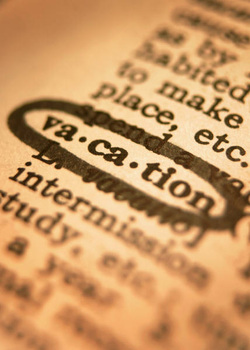 I was so ready to go on vacation, traveling to Philly and South Dakota, that of course I forgot to put up an official 'blog hiatus!' So thanks to those who checked back to see if I wrote anything new. So while I'm still in procrastination, er, vacation mindset, I got to thinking about that time-old question: Why do we Yanks 'take a vacation', while our chums across the pond 'go on holiday?' It turns out that, once again, we can blame our Puritan forefathers for the distinction. The original meaning Originally, the word "vacation" comes from old English, and until the early nineteenth century, it meant something different from our modern U.S understanding of the term. According to our trusty Oxford English Dictionary, the word "vacation" referred to the release or respite from some business, occupation or other activity. For example, in the prologue to the "Wife of Bath," Chaucer (c. 1386) wrote: "Whan he hadde leyser and vacacioun From oother worldly occupacioun." ("When he had leisure and vacation from other wordly occupation.") Vacation could also refer to leisure time for a specific purpose, such as when Thomas a Kempis (c.1450) instructed his readers to "Put the vacacion of god before all other things." Keep this definition in mind. Vacation also referred to those periods when law-courts, universities, or school were formally suspended or closed. In 1456, R. Pecock complained: "Hou myche labour is maad in ynnes of Court in Londoun, bi tymes of vacacioun, aboute the reding..of the Kingis Statutis." (How much labor is made in Inns of Court in London, [during] times of vacation, about the reading...of the King's Statutes.") I believe that this understanding is still common in the United Kingdom today, but feel free to let me know if I'm incorrect. These conceptions of the word "vacation" seem to have transported to the American colonies, and were in use until about the mid-nineteenth century. At this time, a shift in the understanding of the word "vacation" occurred. The shift in understanding According to Cindy Aron, professor of history emeriti at the University of Virginia, the modern U.S. notion of "vacation" first emerged among the elites in the early nineteenth century. While European aristocrats and the middling sorts had long taken excursions for pleasure, (at least back to the Middle Ages, if not the Roman times), such frivolity and hedonism was looked at a bit more askance here in the U.S. Long-held Puritan and Protestant beliefs about idleness and morality certainly kept the middle and working classes in check. In the early 19th century, however, physicians began to cajole their wealthy patients to take a "vacation," for their spiritual and physical health (re-framing those older definitions described above). They did not use the term 'holiday' which probably conjured images of merrymaking and hedonism, and was, in effect, a harder sell. Gradually, the idea of taking a vacation for one's health began to find a hold among the middle class as well. Certainly, the emergence of the railroads dramatically changed the way people thought about travel, particularly for leisure purposes. Previously inaccessible places (including such restorative places as lakes, oceans, hot springs etc) could now be readily reached by train, often for far less money than for a hired hack. Even more interestingly, Aron explains, is that Churches, particularly the Methodists, began to create religious campgrounds and resorts in the mid-nineteenth century. These were designed to appealed to those with holding an ethic that revolved around hard work, discipline and morality (e.g. the middle class). Such places offered a means to "get away from it all" while at the same time, allowing vacationers to feel they had not taken leave of their morals and virtues. "Organized idleness!" By the early twentieth century, members of the working class began to "take vacation" as well. Vacation was no longer a leisure pursuit of the privileged elite, but was rapidly becoming an expectation for most families. Motels, hotels, spas, and resorts became an industry in themselves, many emphasizing affordability and accessibility to attractions. Throughout the twentieth century, many establishments deliberately focused on supplying fun, hedonism and all the vices (Las Vegas, anyone?), and were far less concerned with offering an environment to rejuvenate the body and soul. So "taking a vacation" has certainly transformed over time. Personally, I find it really interesting that leisure had to be legitimated by Americans. Oh, how those Puritan impulses still linger! But whether you're on holiday, or taking a vacation, I hope you are enjoying your organized (unorganized?) idleness. I'll be blogging again soon. Right now, I'm on vacation from my vacation! Reference: Aron, C (1999).Working at Play: A History of Vacations in the United States.
5 Comments
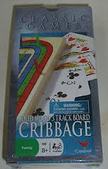 So my son recently received a cribbage game--a game I didn't know too much about but which looked fun enough. When we started to play, however, I happened to read this blurb on the packaging: "Cribbage is believed to have been invented during the 17th century by an English poet." What? Whoa! Cribbage is a 17th century game? Invented by a poet? What poet?! I had to look into this. So, of course, I typed in "History of Cribbage" into the almighty Google, and sure enough I found that "Cribbage was invented in the early 1600s by Sir John Suckling, an English courtier, poet, gamester and gambler." But since I tend not to believe what I read on the internet, I double-checked this information with the well-regarded Dictionary of National Biography. The DNB confirms the circumstantial evidence concerning the invention of the game, citing the biography of Suckling (1609-1641?), written by 17th century antiquarian John Aubrey (1626-1697) in his collection called Brief Lives. 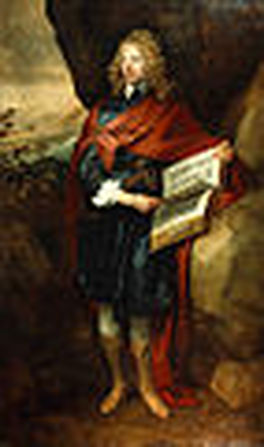 Sir John Suckling -Courtier & Cribbage Creator Aubrey portrays Suckling as quite a merrymaker, anecdotally recalling him as "the greatest gallant of his time" (287). Suckling was, too, alleged to be the "greatest gamester, both for bowling and for cards." He had such a reputation for gambling, it would seem, that "no shopkeeper would trust him for 6d, as today he might by winning, be worth 200 pounds, and the next day he might not be worth half so much" (287-291). Surprisingly, Suckling wasn't actually very good at cards...a bit of a problem for a compulsive gambler. To make up for this deficit, he would "by himself abed, and there studyed how the best way of managing the cards could be." Indeed, he figured out a variation of an existing game--Noddy--which he called "cribbage." Apparently others liked cribbage as well, and he came to make a lot of money off of his reinvention. As Aubrey tells us: "Sir John Suckling invented the game of Cribbidge. He sent his Cards to all Gameing places in the countrey, which were marked with private markes of his; he gott twenty thousand pounds by this way." However, Suckling had a weakness for "Ladies of Quality, all beauties and young." This weakness ended up costing him "many hundreds of pounds," apparently because he enjoyed lavishing them with "silk stockings, garters and gloves." (Brief Lives, 289).
Fun guy, to be sure! Suckling, however, was more than a courtier and a ladies' man. He found time to write--quite prodigiously--and demonstrated some fine insights into the larger political context of the day. All told, he wrote seventy-eight poems, four plays, a few political tracts, as well as at least fifty letters, which according to Aubrey, displayed great intelligence and a "sparkling wit." (287-291) It's actually interesting to consider Suckling's personality when you reflect on the game. After all, cribbage offers a funny balance of strategy and luck, as well as a carefree leapfrog quality. Suckling's dual love of gambling and carousing at play? Just a thought. Eventually, his bad luck at gambling and in love seem to have caught up with him. Sadly, at age 28, when faced with great financial losses, Suckling poisoned himself, "which killed him miserably with vomiting" (291). A sad end...but at least he gave us cribbage. We think. 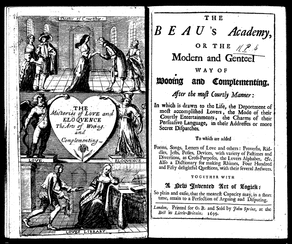 The beau's academy, 1699 Wing / 2854:35 In honor of the new year, I thought I'd offer some words of wisdom from the late 17th century. Granted, these words came from Edward Phillips, The beau's academy, or, The modern and genteel way of wooing and complementing after the most courtly manner (1699). So basically a book on how to be witty with the ladies. I selected a few of Phillips' -er- wisest statements and accompanying commentary (although a few are a tad hard to understand).
On prudent spending: He that spends beyond his ability, may hang himself with great agility. For he is lighter than he was by many a pound. (I have to say, this is one of Phillips' more sensical statements!) On the perils of whispering sweet nothings: Good words cost nothing. Unless it be love verses, for some men do pay. On fighting: He that cannot fight let him run. Tis a notable piece of Machiavelian policy. (I'm envisioning some poor battle-shocked Redcoats being relieved of their weapons and released to the elements....Machiavelian indeed!) On cooking: Better no pies, than pies made with scabby hands. (um, definitely one to keep in mind!) He's an ill cook that licks not his own fingers. (Methinks Tom Colicchio would concur!!!) On being a good provider: Good at meat, good at work. Therefore, 'tis the best way always to eat stoutly in the presence of women. (Got that, men?) ...and a few I can't easily categorize, but which sound a little naughty: Of idleness, comes no goodness. For that is the reason so many maids have the green sickness. (The "green sickness" [chlorosis or hypochromic anemia] was once considered "pecuilar to virgins." So being idle won't do anyone any good!) Hungry dogs love dirty puddings. There's many a man hath lost his nose by verifying this proverb. (I'll let someone else interpret this one!) Just a little something to ponder!!! 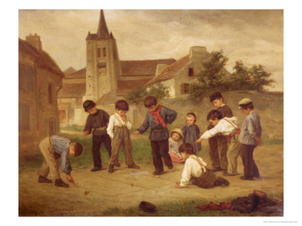 Watching my five-year old play hopscotch the other day got me wondering--where did this simple game come from anyway? I mean, if you think about it, doesn't HOP SCOTCH sound like it's connected to beer and liquor? Maybe the game came from kids watching adults stumbling out of taverns, under the influence, trying to hop on one foot while picking up stuff they'd dropped, without toppling over. Maybe kids mimicked the grown ups and over time--voila!-- the game of hopscotch emerged. (Okay, I'm writing this entry on a Friday night after a LONG week, so I could be reaching.) 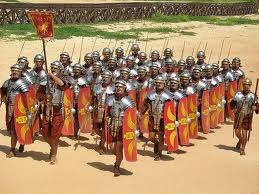 so these guys played hopscotch? Indeed, a quick internet search informed me that no, hopscotch has nothing to do with alcohol (darn it! I thought I was onto something there). Instead, a jillion sites claim that the game actually derived from an ancient Roman military training exercise. Roman soldiers, wearing full body armor, would hop through a hundred-yard field in a precise way, to help improve their footwork in battle. (Cool, hey? Shall I stop here?) Wel-l-l-l, I'm always a bit skeptical of what I read on the internet. Especially since many of these sites seemed to be just parroting the same tidbit over and over without any evidence. And there didn't seem to be any evidence of the term before the seventeenth century. And then I found this fascinating bit of detective work carried out by the "Rogue Classicist." Here, he essentially traced the origins of the hopscotch myth--and yes, it is a myth--to a misunderstanding. Apparently, in 1870 a scholar sharing his findings in an archeology journal made an offhand comment to the effect that some ancient tiles and disks might be 'admirably suited to our modern game of hopscotch.' But someone else misunderstood, and made an erroneous leap--reading a link from ancient times to modern game that was not there. This misunderstanding was picked up, and repeated so many times that eventually it became "fact". Oh, and what's the truth of it all? Hopscotch, originally called "scotch-hop", was a game which probably emerged in seventeenth-century England (although similar games can be found around the world.) First mentioned in the Book of Games in the 1670s, Francis Willughby describes the game of "hopscotchers" in which children play with a little piece of lead on a floor with lines etched--or "scotched"--onto its surface. So, a game. However, if you prefer, we can rewrite the history of hopscotch once again. Just cut and paste my imagined origins of the game--you know, where kids were laughing at drunk grown-ups--and pass it off as fact. What do you think? 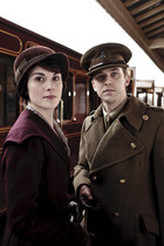 Entrenched in intrigue I'm always fascinated by the way words seep into the English language. In honor of my Downton Abbey withdrawal and Florence Green (the last World War I veteran who passed away a few weeks ago at 111) AND because I recently wrapped up a class discussion on the Great War, I thought I'd say something about how WWI introduced some rather evocative--if heartbreaking--language into our vocabulary. 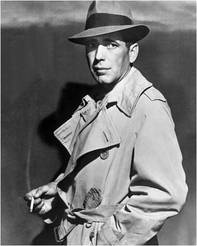 fashion from the trenches In 1914, Burberry was commissioned to create a new type of coat, the trench coat, that would allow British officers to stay both stylish and comfortable during the war (not sure how that worked out...) After the war, the coat became extremely popular, made even more so when it made its way to Hollywood. (Nowadays, the trench coat is so pervasive, I always wonder if anyone thinks twice about its origins.) Lots of phrases are still around, too, mostly from the terrible conditions soldiers had to face. "In a funk" (feeling dejected) may have referred to the (funky/smelly) holes in the trench walls where soldiers could stand to keep dry."Lousy" referred first to lice infested clothes, later to everything crummy. "Dig oneself in" (stick to one's ground, being stubborn) came from entrenching. To be "Up against the wall" (in a difficult spot) probably came from deserters' placed in front of a firing squad. (All a bit stomach-churning, really). Shell-shock--a kind of obvious one. And sadly, "basket case," a term for someone who's a bit screwed up, arose from the practice of transporting severely injured men in baskets. 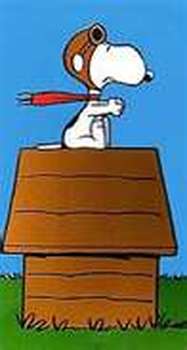 Snoopy stayed out of the trenches Some, of course, came from the early aviation: "In a tail-spin," "joystick," "nose dive" --all essentially descriptive. "Hush-Hush" referred to top secret operations. And a "dud" (a failure) comes from an unexploded mine or shell. And of course, the very best. Snoopy, the World War I flying "Ace." An excellent pilot, he was the high card to play against the dreaded Red Baron. (Although, now, when I see Snoopy reenact the prolonged suffering of a lonely airman stationed in France, I find it quite disturbing.) What other vestiges from the Great War do we still speak and hear daily? You tell me! 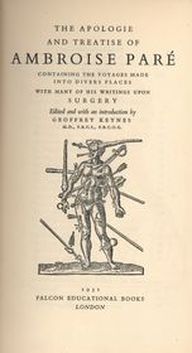 17th c. detective of poisons A few weeks ago, I wrote about the first female literary sleuths, and since then I've since been wondering about the real first "detectives." I don't mean just any investigators of criminal activity, for surely, those have existed since time immemorial. But I was curious about when the term "detective" emerged as a recognizable title and/or occupation. The word does appear in the Early English Books Online as early as 1634. However, the word detective was not used as a noun, but rather as a verb, referring to the process of detecting. Specifically, the "famous chirugion [surgeon] Ambrose Parey" detective the effects of deadly poisons on the human body. Turning to my trusty Oxford Etymological Dictionary, I found that as a noun, "detective" was not used before before 1843. According to the Chambers Edinburgh Journal, "Intelligent men have been recently selected to form a body called the ‘detective police’‥at times the detective policeman attires himself in the dress of ordinary individuals." (12: 54). The word was later referenced in Willis' discussion of modern thief-taking in 1850: "To each division of the Force is attached two officers, who are denominated ‘detectives’" (C. Dickens, Househ. Words 13 July 368/1). Prior to 1850, those conducting investigations might have been called a searcher (1382), intracer (?a1475), inquisitor (?1504), inseer (1532), theif taker (1535) (my favorite, and the one I use!), peruser (1549) investigator (1552), tracer (1552), scrutineer (1557), examiner (1561), revisitor (1594), researcher (1615), examinant (1620), indagator (1620) (that's a great one!), ferret (1629), (another great one!), pryer (1674A), probator (1691), disquisitor (1766), grubber (1776), prober (1777), plant (1812), grubbler (1813), and plain clothes (1822). After 1850, additional colorful slang variants were used: Plainsclothesman (1856), mouser (1863), sleuth (1872), tec (1879), dee (1882) (shortened version of detective), sleuth-hound (1890), split (1891) (evolution of informer, turning against another person), hawkshaw (1903) (a character in a play), busy (1904), gumshoe (1906), (from the quiet stealthy shoes detectives began to adopt), dick (1908) (comes from a colloquial collapsing of 'detective'), and Richard (1914) (the common surname for nickname Dick). (Most of these expressions, it should be noted, came from criminal slang) And the first real person to be called detective? Well, it's hard to say... 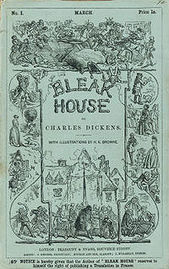 In literature, the first detective is usually considered to be August Dupine in Edgar Allen Poe's Murder in the Rue Morgue (1841) (although I don't think he's referred to in the original version as a detective). Paul Collins, an associate professor at Portland State, a.k.a. the literary detective, has made the case for Charles Felix's detective in Velvet Lawn (1862) as the first of the genre. (On my list to read!). Others have argued for Inspector Buckett from Charles Dickens' Bleak House (1853), who may well have been based on a real private investigator that Dickens knew. 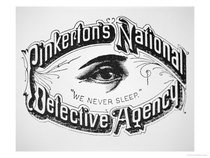 "We never sleep?!" Hey, that's my motto These works, demonstrating the emerging professionalism of detectives (or inspectors), clearly were influenced by larger nineteenth-century trends--most notably the ongoing reform efforts (which called for systematic, often covert, investigations into the corrupted and abusive practices found in factories, prisons, schools, hospitals, etc). Something else accompanied that change. As an investigator, the nineteenth-century detective was trying to systematically solve problems, using science to find solutions to the puzzles that plagued society. The "new" detectives were adopting a scientific, logical quality to the process of capturing criminals. The first known (and organized) private detective agency emerged in France in 1833. This occurred under the auspices of Eugène François Vidocq, a soldier turned privateer, who lived much of his early life on the run from from the law. (Apparently, Victor Hugo was so impressed with Vidocq that he based not one, but two, of his most important characters in Les Miserables--both Jean Valjean and Inspector Javert--on the man). Officially, however, at least in the U.S., Allen Pinkerton, a transplant from Glasgow, Scotland became Chicago's first detective in 1849. Soon after, he set up his famous Pinkerton National Detective Agency in the 1850s. Ultimately, this professionalization of the detective--with its' new emphasis on applying science, logic and technology to catching criminals--gradually reshaped the image of the investigator from "thief taker" to puzzle solver. These trends seem to have substantially influenced at least the first few generations of literary detectives, maybe more. Enter Sherlock, Poirot and all those who rely on "their little grey cells" to solve mysteries... (I do think the recent trend of paranormal crime solvers indicates the inevitable backlash, however, but that's another story). What do you think? |
Susanna CalkinsHistorian. Mystery writer. Researcher. Teacher. Occasional blogger. Categories
All
Archives
May 2023
|
 RSS Feed
RSS Feed